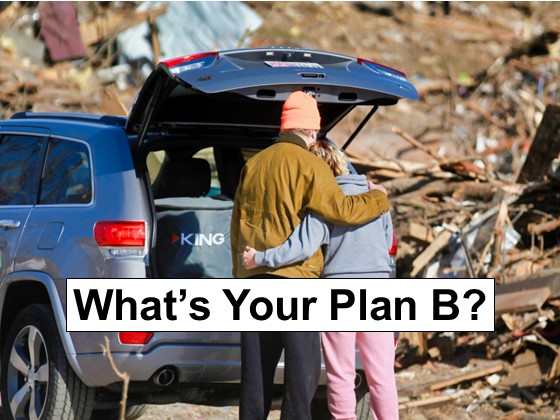I read an article last week titled What Are Your Plan B and C to Survive a Disaster? and I like the advice given very much. At minimum, I appreciate the thinking. Most folks, I’m afraid, don’t consider their survival needs much beyond, “I sure hope the power comes back on soon … my luncheons are going to spoil soon!”
Okay, I’m being a tad unfair. I’m sure most people have some sort of plan to get through a minor inconvenience. Or, at least, the ability to get through it. What the article discusses, however, is one’s ability to deal with a one-thousand year disaster. These are disasters so big that they’re only expected to occur once in a thousand years! They’re the disasters that keep insurance adjusters up at night. Back to back devastating hurricanes are a good example.
While I encourage you to read the article so that I don’t have to rehash the specifics here—she goes into suggestions for backup plans on cooking, lighting, heat, food, and water storage, and more. The idea of having backup plans (and backup plans for backup plans) is something we should all strive for, especially as preppers.
It’s why we have a plan to bug out when we would rather stay put. It’s why we have a way to charge our phones when the outlets stop working. It’s why we keep hand tools for when the power tools stop working.
It’s why preppers do many things, and why we ask questions, like:
- What happens if I can’t … use the cookstove, flush the toilet, or turn on the lights?
- What do I do when … the propane runs out, my flashlight breaks, or I run out of gasoline?
- Where do I go if … my house becomes uninhabitable, I’m forced off my bug out route, or my evacuation destination is no good?
- What do I do if … I can’t reach my spouse/kids/parents, I can’t return home to rendezvous/gather supplies/get the dog, or my car breaks down? (FYI, I’m getting home to get my dogs even if it kills me.)
Questions like these, and dozens of others, are where one should start when you really want to take your preparedness seriously. I’ve been asking these types of questions of myself for many years, and I’m hoping you are, too.
Although many questions and the answers provided are similar for most folks, sometimes there are nuances specific to your family and your situation. That’s okay. But you probably won’t know those specific questions and answers until you ask the basic ones, like those mentioned above.
At the very least, if you take the time to consider your plan B (and plans C and D as you discover more problems and solutions) for the most obvious questions, like cooking, lighting, and heating, then you’ll be in so much better shape than nearly everyone who continues thorough life oblivious!
For those in the military, an acronym they use for communication purposes is P.A.C.E., though I suspect they use it for other plannings purposes, too. According to ChatGPT, P.A.C.E. is:
In military terms, P.A.C.E. stands for Primary, Alternate, Contingency, and Emergency. This is a communication planning framework that ensures reliable communication options in various scenarios. Each component represents a different method of communicating, arranged in order of priority:
- Primary – The main method of communication (e.g., radio).
- Alternate – A secondary method if the primary fails (e.g., satellite phone).
- Contingency – A backup for critical situations when both primary and alternate methods fail (e.g., messengers or runners).
- Emergency – The last-resort option, usually very basic but highly reliable (e.g., signal flares or emergency beacons).
P.A.C.E. ensures that communication remains possible under adverse conditions, so teams can stay coordinated and maintain operational effectiveness.
Honestly, I prefer plans B, C, and D, but use whatever works for you. Ultimately, the point is obvious: don’t rely on only one way to do something because that one way could become damaged, simply stop working, get stolen, misplaced, or not work as intended when needed most. Don’t let that happen to you!

Leave a Reply